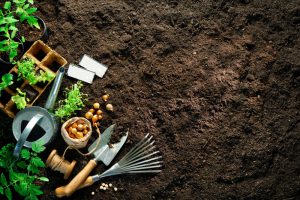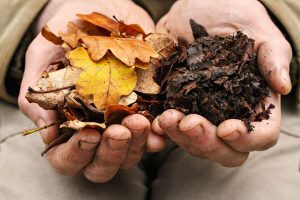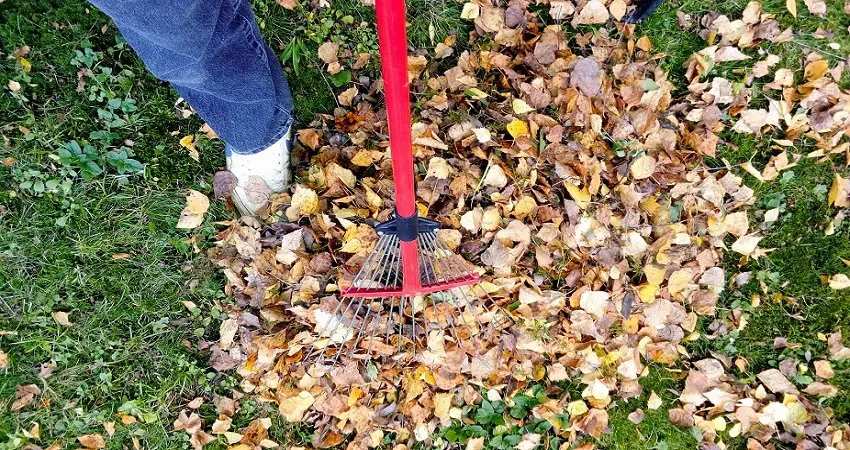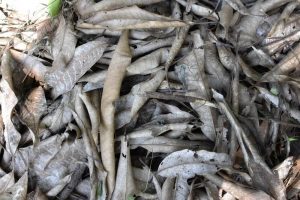Last Updated on June 23, 2022 by Gary Stephen
When fall is rolling into winter, we can quickly grab the rake to clean up the unsightly leaves and do away with them as soon as possible. Gardens should be orderly and neat, after all. Some gardeners will then dump the leaves outside their home in a bag to be picked up and tossed by the local garbage disposal. But a more intelligent and far wiser gardener will instead keep the leaves to use in the garden. And there are many uses for your bag of old leaves!
Leaves are some of the best organic materials you can find in a garden, and if you have a tree that drops them in winter, you should rather keep them than toss them.
Before using leaves in your garden
Although we can indeed praise leaves to heaven and back for their benefits in your garden, there are a few things to keep in mind before doing so.

- Make sure you use the correct type of leaf. Leaves from eucalyptus, walnut, and camphor laurel contain certain substances that can seriously damage your plant’s growth. Be sure to compost these before adding them to the garden bed.
- Only use shredded leaves and make sure they’re appropriately shredded. Using whole leaves, or even partially whole leaves, can create a mat or blanket through which water won’t get through. This will also raise the soil’s temperature and damage some of your root systems – plants don’t like it that warm around the roots. Make sure your leaves are well shredded before using them.
Although you need to keep a few things in mind when using leaves, they won’t let you down in the long run. But with all the cautions out of the way, here are five reasons why you should keep your leaves!
Leaves can be a good use in garden compost

Most gardeners are aware of the fact that leaves can be used to make some excellent compost. If you’re cultivating compost, add the shredded leaves into the mix. It makes a far more organic compost with superior insulation, minerals, and moisture retention. But the reason why most gardeners skip making compost from leaves is simple; it’s a schlep to shred those leaves.
How to shred leaves: To make your life easier, try using a rotary mower to collect the leaves. It immediately shreds them and will make it a much neater procedure overall.
Another alternative to shredding your leaves is to pile them in the yard and drive your lawn mower over them a few times. It’s a bit more work, but it gets the job done. If you don’t want to get the lawnmower, you can always drive over them a few times. It might take a few tries but doing so a few times a day will quickly bring those stubborn leaves down to a pile of shreds.
If you don’t want to get the car, how about just walking over them? You can even get your kids to help. Make a game out of it and jump on the leaves to break and crack them. It certainly is some good exercise.
Finally, you can buy your very own leaf shredder! If you’re an advent gardener, this is an excellent purchase as you will end up saving money on both mulch and compost.
Good Use of leaves to protect your smaller garden plants in winter!
After you’ve collected your leaves, pile them up and around those plants that might suffer during those snap-cold winters. Leaves are excellent insulators, and you can easily protect some seriously delicate plants with some leaf protection. Gently place the leaves around the plants until it covers the roots system and stem of the plant. If you have some frigid winters, try wrapping burlap around the plant along with the leaves. Many good plants have been saved using this simple method.
-
Make some mulch!
Much like compost, you can also use leaves to make some high-quality mulch. After you’ve shredded the leaves, put them aside for a month or so to let them rot through. Once they’ve rotten down a bit, mix them into the mulch and then into the soil. Mulch can be used in raised garden beds to cover unsightly roots in your garden, suppress weeds, retain moisture in the ground, and helps make your garden look prettier!
Benefits of adding leaves into the soil: Leaves are a great source of nutrients for your friendly earthworms, so having some leaves in your bedding is always a great idea! They also bring in essential nutrients to feed the soil and keep your plants healthy and robust. Furthermore, leaves can balance the nitrogen in your ground with its natural carbon. What’s more, they also lighten heavy soils and help your soil to retain its moisture.
-
Make some leaf mold!
If you have a big pile of leaves, you can leave them for around 2-3 years. This will begin forming fungus on the leaves, which will break the leaves down into excellent compost. This compost has some severe water retaining abilities and is high in calcium and magnesium. To speed up the process considerably, shred the leaves first. This is a long wait anyway you swing it, but the rewards are well worth it.
Benefits of leaf mold: Leaf mold has some profound long-term benefits. It dramatically increases the quality of the soil and boosts the soil’s life.
-
Keeps your ladybug friends happy
Instead of mulching the leaves, how about leaving them on the ground for the whole winter? Some helpful bugs, like ladybugs, need a toasty spot to call home during their hibernation. Ladybugs are excellent predators against all sorts of pests like spider mites and aphids. If you let your leaves stay where they are, your ladybugs can stay safe and warm and be ready to help you combat those pests come spring.
Furthermore, if you leave your leaves till spring at least, they will turn nice and crunchy. You can then mow them (shred them) and leave them where they lie. This will serve as a natural mulch for your lawn.
Conclusion of How Leaves are Good for Your Garden
Don’t toss your leaves! Although they might be considered unsightly on the lawn, and a hassle to shred up, and backbreaking to rake, it is well worth the effort for all the benefits it gives your garden. Mulch, compost, and protect your ladybirds, there are few things that you can find naturally in your garden, which offers such a wide range of benefits.
So, be happy with those leaves! And use them to the full extent in your soon-to-be well-composted garden.


